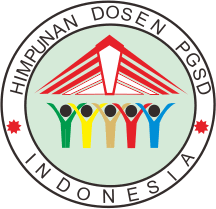Inovasi pendidikan abad 21: penerapan design thinking dan pembelajaran berbasis proyek dalam pendidikan Indonesia
Abstract
21st-century education is characterized by technological developments that are developing very rapidly, so daily learning must be in harmony with existing technology. Education in modern-day Indonesia requires innovation for more advanced learning. Therefore, Indonesia needs innovation to carry out learning that is following the nation's character, as well as a charactergemeinschaft (character builder) of students who will become the nation's next generation. The purpose of this study was to find out 21st-century educational innovations by applying design thinking to project-based learning in Indonesian education. The benefit of this research is that it can become a source of fresh scientific references among academics and become new reading material and literacy resources related to education. This study uses a descriptive qualitative approach with an emphasis on phenomenology. The method of data analysis in this study was carried out by descriptive analysis method, namely, the data obtained and then analyzed by descriptive analysis method. Indonesian education must include an innovation with the application of design thinking in project-based learning. Without an innovative “breakthrough”, Indonesian education cannot reach a point where the potential of students can be fully maximized.
Keywords
Full Text:
PDFReferences
Satria, Arif Bagas Adi. (2021, 5 Maret). Topeng Pendidikan Kita: Pendidikan untuk Mencerdaskan Bangsa atau Sebaliknya?. UIN Walisongo. https://www.youtube.com/watch?v=Xt2c4f_JFhg
Winarni, Endang Widi. (2018). Teori dan Praktik Penelitian Kuantitatif, Kualitatif, PTK, R&D. Jakarta: Bumi Aksara.
Anreasen, L.B. & Nielsen, J.L. (2013). Dimensions of Problem Based Learning – Dialogue and Online Collaboration in Projects. Journal of Problem Based Learning in Higher Education, 1 (1), 210-229.
Moleong, L.J. (2013). Metodologi Penelitian Kualitatif. Bandung: Remaja Rosdakarya.
Sofiana, Yunida. (2014). Pemahaman Critical Thinking, Design Thinking Dan Problem Solving Dalam Proses Desain. Jurnal Humaniora. 5 (2): 649-654.
Purnomo, Dwi. (2013). Konsep Design Thinking Bagi Pengembangan Rencana Program Dan Pembelajaran Kreatif Dalam Kurikulum Berbasis Kompetensi, Konferensi Nasional Inovasi dan Technopreneurship IPB International Convention Center.
Mintrom, Michael & Luetjens, Joannah. (2016). Design Thinking in Policymaking Processes: Opportunities and Challenges. Australian Journal of Public Administration. 75 (3): 391-402.
Doppelt, Y. (2003). Implementation and Assesment of Project Based Learning in Flexible Environment. Instructional Journal of Technology and Design Education, 13: 255-272.
Giilbahar, Y & Tinmaz, H. (2006). Implementing Project-Based Learning and E-Portofolio Assesment In An Undergraduate Course. Journal of Research on Technology in Education, 38 (3): 309-327.
Morgan, A. (1983). Theoritical Aspects of Project Based Learning in Higher Education. British Journal of Educational Technology, 14 (1), 66-78.
Harmer, N. (2014). Project-based Learning. England: Plymouth University.
Ngalimun. (2013). Strategi dan Model Pembelajaran. Yogyakarta: Aswaja Presindo.
Lemke, C. (2003). Engauge 21st century skills: Digital literacies for a digital age. Naperville, IL: North Central Regional Education Lab.
Mayasari, Tantri. Kadarohman, Asep. Rusdiana, Dadi. Kaniawati, Ida. (2016). Apakah Model Pembelajaran Problem Based Learning Dan Project Based Learning Mampu Melatihkan Keterampilan Abad 21?. JPFK. 2 (1): 48-55.
Trilling, B., & Fadel, C. (2009). 21st century skills: Learning for life in our times. San Francisco: Wiley.
Zubaidah, Siti. (2016). Keterampilan Abad Ke-21: Keterampilan Yang Diajarkan Melalui Pembelajaran. Seminar Nasional Pendidikan dengan Tema “Isu-Isu Strategis Pembelajaran MIPA Abad 21, 10 Desember 2016, di Program Studi Biologi STKIP Persada Khatulistiwa Sintang – Kalimantan Barat.
Pink, D.H. (2005). A Whole New Mind: Berpindah Dari Jaman Informasi Menuju Jaman Konseptual. Jakarta: Penerbit Dinastindo.
Avital, M. & Boland, R. J. (2008). Managing as Designing with a Positive Lens. Advanced in Appreciative Inquiry Volume 2: Designing Information and Organizations with a Positive Lens. Elsevier Ltd.
Brown, T. (2008). Design Thinking. Harvard Business Review. June 2008, p. 84 – 92.
Brown, T. (2009). Change by Design. New York: Harper Collins
De Bono, Edward. (2000). New Thinking for the New Millennium. California: New Millennium Entertainment.
Husein, Ananda Sabil. (2018). Metode Design thinking untuk Inovasi. Malang: UB Press.
Qiu, R. (2008). Creative problem-solving strategies for science and technology teaching activities design—Wonderful Ideas for “frames”. Life Sci. Educ. Mon. 41, 49–60.
Chen, L.A. (2006). Theory and Practice of Creative Thinking Teaching, 6th ed. Taiwan: Psychological Publishing.
Huang, Z. Lin, P. (2008). Cooperative Learning. Taiwan: Five South.
Cai, Z.X. (2001). The characteristics of physical education in the nine-year curriculum in the national education stage. Sch. Sports. 66: 25–34.
Parnes, S.J. (1967). Creative Behavior Guidebook. New York: Scribners.
Falconer, I., & Littlejohn, A. (2008). Representing models of practice. In L. Lockyer, S. Bennet, S. Agostinho, & B. Harper (Eds.), Handbook of research on learning design and learning objects: Issues, applications and technologies . Hersey: IGI Global.
Conole, C. (2004). E-learning: The hype and the reality. Journal of Interactive Media in Education, 2004 (12). Available online at http://www-jime.open.ac.uk/2004/12. Accessed 11 Aug 2011.
Oliver, R. (2000, December 9–12).Where teaching meets learning: Design principles and strategies for Web-based learning environments that support knowledge construction. In Proceedings of the ASCILITE Conference , Coffs Harbour. Available online at http://www.ascilite.org.au/conferences/coffs00/papers/ron_oliver_keynote.pdf. Accessed 11 Aug 2011.
Masterman, L. (2008). Activity theory and the design of pedagogic planning tools. In L. Lockyer, S. Bennett, S. Agostinho, & B. Harper (Eds.), Handbook of research on learning design and learning objects: Issues, applications and technologies (Vol. 1, pp. 209–227). Hershey/New York: Information Science Reference.
Refbacks
- There are currently no refbacks.


